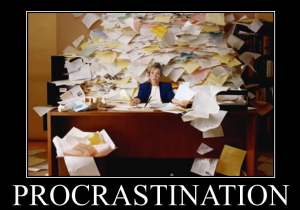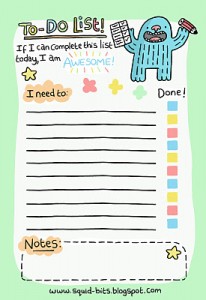Recognize this scenario? You start your day full of enthusiasm and determination to get a lot of work done, but when evening falls you are surprised at how little you have actually achieved. Unfortunately, time didn’t stop to wait for you while you were busy chatting with your friends on Facebook or watching You Tube videos. Your to-do list still shows an alarming number of unticked boxes.
One of the main reasons we don’t get things done is because we postpone or procrastinate. This is nothing to be ashamed of, as research has shown that roughly 95% of all people suffer from procrastination. Yet it is a problem worthwhile tackling, argues Piers Steels, a Canadian professor of psychology who studied procrastination for over ten years. Steels’ research has shown that extreme procrastinators are less happy, healthy and wealthy than those who usually get their to-do boxes ticked.
To be sure, procrastination does not mean postponing things because they don’t fit into your schedule; it means postponing them irrationally, thinking or knowing you should be doing them now.
 The opposite of procrastination is motivation. The lower your level of motivation, the more you will procrastinate, and vice versa. According to procrastination professor Steels, motivation (and therefore procrastination) is determined by four factors.
The opposite of procrastination is motivation. The lower your level of motivation, the more you will procrastinate, and vice versa. According to procrastination professor Steels, motivation (and therefore procrastination) is determined by four factors.
- The first is our expectation of how, if and when we will accomplish the task. If our expectation is low (we doubt if we will be able to stick to that diet, or we don’t think we will ever be able to learn how to meditate), motivation is also low, and we will be more likely to put the task off.
- A second contributor to our motivation is how much we enjoy the task we want to get done – in other words, the fun factor. The more tedious the job, the more likely we are to postpone it.
- A third factor is time. The more time we have to complete a certain job, the more our motivation to work on it right now will fall. Of course the opposite is also true. Almost everybody has experienced the urgent motivation of a tight deadline. Some people only seem to get work done under the threat of a looming deadline.
- The fourth and perhaps biggest influence on motivation (and hence, procrastination) is what Steels calls ‘impulsiveness’, or our tendency to let ourselves become distracted. Distractions are out there to tempt us twenty-four-seven, especially in this day and age. Who hasn’t ever interrupted work to check e-mails, watch a You Tube video or reply to a Facebook message? Yet the more we are distracted the more we procrastinate and the less we actually get done. It takes quite a bit of discipline and self-control to keep the distraction-thief at bay, but it can be done with the help of a little cunning. Read on…
Three exercises to start getting things done
To experience that satisfied feeling at the end of the day when you have met your daily goals, try these three exercises. They will help you diminish the habit of putting things off.
 Formulate mini-goals. When the task at hand is big, we tend to get overwhelmed by its sheer size and often opt the easy way out by putting it off. Instead, divide the task into small segments or ‘mini-goals’ of about ten minutes each that are overseeable and easy to accomplish. So instead of ‘cleaning the house’ you simply start with minigoal one: the kitchen table. After that it’s the kitchen sink and the kitchen floor. After that you can move on to the living room floor, table and bookshelves. Before you know it you’re already halfway. It is wise to make the segments as concrete and tangible as possible, since a too abstract goal tends to fuel procrastination. Therefore say, ‘collect all the bills’, instead of ‘doing the taxes’.
Formulate mini-goals. When the task at hand is big, we tend to get overwhelmed by its sheer size and often opt the easy way out by putting it off. Instead, divide the task into small segments or ‘mini-goals’ of about ten minutes each that are overseeable and easy to accomplish. So instead of ‘cleaning the house’ you simply start with minigoal one: the kitchen table. After that it’s the kitchen sink and the kitchen floor. After that you can move on to the living room floor, table and bookshelves. Before you know it you’re already halfway. It is wise to make the segments as concrete and tangible as possible, since a too abstract goal tends to fuel procrastination. Therefore say, ‘collect all the bills’, instead of ‘doing the taxes’.- Avoid distractions. Research has shown that it takes about fifteen minutes to regain concentration after letting distractions (think Facebook, You Tube, e-mail) interrupt your work. The best way to outsmart distractions is to keep these temptations as far away from you as possible. Switch off the phone, and better yet, your internet connection when you are working. If you need internet for work, do as Piers Steels does and create an alternative work-login on your computer. Program that login such that it doesn’t open computer games, social network sites or other highly distractive websites. For Mac users the program ‘Concentrate’ can close off certain parts of the internet when we are working.
- Work during your peak hours. Professor Steels used to be a procrastinator himself. The method he applied to stop himself from putting things off was discovering his ‘peak hours’, the period in the day when he tended to be most productive. In his case he peaked between 10 a.m. and 3 p.m. ‘If I use my peak hours properly I can get a tremendous amount of work done, even if I don’t do much the rest of the day,’ he says.
We all have a daily peak period, but the actual time varies per individual. How to discover your own peak hours? According to Steels the end of the period is marked by a decrease in energy, the so-called ‘afternoon dip’ (or ‘evening dip’ for some). Subtract five or six hours from this energy dip to get the starting point of your peak hours. Use these hours wisely and laze around as long as you like the rest of the day.

